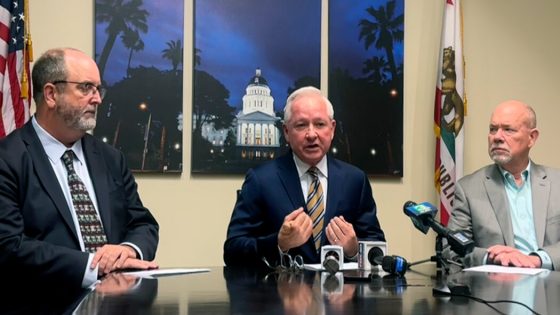Californians are used to big political fights over ballot measures, but the fights don’t usually end like this. On Thursday, the California Supreme Court unexpectedly cut short a gathering war over one of the most sweeping anti-tax proposals since the 1970s, before voters could even consider it.
The ballot measure, the Taxpayer Protection and Government Accountability Act, has been a flashpoint in Sacramento for months. It was scheduled to go before voters in November. If enacted, it would have made all kinds of taxes and fees in the state — including those imposed by local governments and agencies — much more difficult to raise.
The business and anti-tax groups that gathered more than a million signatures to qualify the initiative for the ballot promised that it would close loopholes and improve transparency. State officials sued, arguing that the measure would fundamentally and illegally revise the State Constitution and that it would gum up even changes in library fines.
Under California’s Constitution, state tax increases already must clear a higher bar than other kinds of legislation: They require approval by two-thirds majorities in each chamber of the Legislature. But many state fees that fund public services are not classified as taxes and can be approved administratively by state boards and agencies. And many local assessments need only a simple majority of local voters or of local boards and councils.
The proposed initiative would have required that any state tax increases be approved not only by supermajorities in the Legislature but also by a majority of the state’s voters directly. Fee increases that are now approved by state agencies and boards would also require legislative approval. Local special taxes would have to be approved by a two-thirds supermajority of voters. And local fee increases would require a local government vote.
The measure also would have retroactively canceled any tax and fee increases during the past two years that failed to comply with the new rules, unless voters and lawmakers re-approved them over the next 12 months.
California’s Supreme Court rarely reviews ballot measures before they are put before voters. But the extent of the proposed changes and the potential to invalidate existing taxes and force local authorities to schedule new elections prompted the court to make an exception, Associate Justice Goodwin Liu wrote.
Proponents said the retroactive provisions would affect only a few dozen tax and fee increases, but city officials said the measure threatened billions of dollars in previously approved local revenue.
In Los Angeles, for instance, the measure could have forced reconsideration of a “mansion tax” on property sales of more than $5 million. Proceeds from the tax help pay for affordable housing. The tax was approved in 2022 by 58 percent of Los Angeles voters.
Real estate interests in the city say that the tax has depressed the luxury real estate market. If the statewide initiative passed, they were expected to demand that the Los Angeles tax be nullified unless voters passed it again by a two-thirds majority.
On Thursday, the justices unanimously ordered that the measure be kept off the ballot, because it would unconstitutionally usurp legislative authority and “transform the process of levying state taxes that has existed since the state’s founding.”
The decision came at a time when California lawmakers have been grappling with a significant budget shortfall. It is seen as a victory for Gov. Gavin Newsom, the Democrats who dominate state government and California’s public employee unions.
Anti-tax movements have a long history in the state. Most notably, Proposition 13 in 1978 radically curtailed property taxes and set off a national tax revolt. Conservative groups have often placed anti-tax initiatives on state ballots as a way to pressure Democrats to approve pro-business legislation and to energize the state’s Republican base.
“The governor believes the initiative process is a sacred part of our democracy,” a spokesman for the Newsom administration said in a statement, “but as the court’s decision affirmed today, that process does not allow for an illegal constitutional revision.”
Initiative proponents questioned the neutrality of the seven justices, six of whom were appointed by Democratic governors.
“Any semblance of impartiality on the part of the California judiciary is now gone,” said Jon Coupal, the president of the Howard Jarvis Taxpayers Association. In a statement, he and other members of the anti-tax campaign, including Rob Lapsley, president of the California Business Roundtable, and Matthew Hargrove, chief executive of the California Business Properties Association, called the court’s ruling “the greatest threat to democracy California has faced in recent memory.”
Proponents conceded that, for now, they had probably lost this battle. But by taking the issue off the November ballot, the ruling promises to free up substantial money on both sides that could be spent instead on congressional races and other ballot measures.
Tell us
We’re almost halfway through 2024. Tell us what the best part of your year has been so far, whether it is a special birthday, graduation or just something going well in your life.
Email us at [email protected]. Please include your name and the city in which you live.
And before you go, some good news
Terrie and Dave Drewry of Auburn, the owners of a donkey they named Diesel, were devastated when they lost their pet five years ago. Volunteers searched for Diesel but could not locate him.
Now, a video has revealed a clue of where he’s been, CBS reports.
A hiker’s social media post showed a lone donkey among a herd of elk, and the Drewrys feel confident the donkey is Diesel. The herd is only a few miles away from where Diesel was last seen in 2019.
They have no plans to separate Diesel from his new family. “Finally, we know he’s good,” Terrie said. “He’s living his best life. He’s happy.”
Source Agencies



